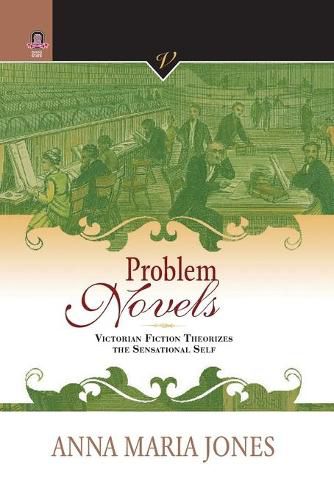Readings Newsletter
Become a Readings Member to make your shopping experience even easier.
Sign in or sign up for free!
You’re not far away from qualifying for FREE standard shipping within Australia
You’ve qualified for FREE standard shipping within Australia
The cart is loading…






This title is printed to order. This book may have been self-published. If so, we cannot guarantee the quality of the content. In the main most books will have gone through the editing process however some may not. We therefore suggest that you be aware of this before ordering this book. If in doubt check either the author or publisher’s details as we are unable to accept any returns unless they are faulty. Please contact us if you have any questions.
In Problem Novels, Anna Maria Jones argues that, far from participating invisibly in disciplinary regimes, many Victorian novels articulate sophisticated theories about the role of the novel in the formation of the self. In fact, it is rare to find a Victorian novel in which questions about the danger or utility of novel reading are not embedded within the narrative. In other words, one of the stories that the Victorian novel tells, over and over again, is the story of what novels do to readers. This story occurs in moments that call attention to the reader’s engagement with the text.
In chapters on Wilkie Collins, Anthony Trollope, and George Meredith, Jones examines problem novels -that is, novels that both narrate and invite problematic reading as part of their theorizing of cultural production. Problem Novels demonstrates that these works posit a culturally imbedded, sensationally susceptible reader and, at the same time, present a methodology for critical engagement with cultural texts. Thus, the novels theorize, paradoxically, a reader who is both unconsciously interpellated and critically empowered. And, Jones argues, it is this paradoxical construction of the unconscious/critical subject that re-emerges in the theoretical paradigms of Victorian cultural studies scholarship. Indeed, as Problem Novels shows, Victorianists’ attachments to critical detective work closely resemble the sensational attachments that we assume shaped Victorian novel readers.
$9.00 standard shipping within Australia
FREE standard shipping within Australia for orders over $100.00
Express & International shipping calculated at checkout
This title is printed to order. This book may have been self-published. If so, we cannot guarantee the quality of the content. In the main most books will have gone through the editing process however some may not. We therefore suggest that you be aware of this before ordering this book. If in doubt check either the author or publisher’s details as we are unable to accept any returns unless they are faulty. Please contact us if you have any questions.
In Problem Novels, Anna Maria Jones argues that, far from participating invisibly in disciplinary regimes, many Victorian novels articulate sophisticated theories about the role of the novel in the formation of the self. In fact, it is rare to find a Victorian novel in which questions about the danger or utility of novel reading are not embedded within the narrative. In other words, one of the stories that the Victorian novel tells, over and over again, is the story of what novels do to readers. This story occurs in moments that call attention to the reader’s engagement with the text.
In chapters on Wilkie Collins, Anthony Trollope, and George Meredith, Jones examines problem novels -that is, novels that both narrate and invite problematic reading as part of their theorizing of cultural production. Problem Novels demonstrates that these works posit a culturally imbedded, sensationally susceptible reader and, at the same time, present a methodology for critical engagement with cultural texts. Thus, the novels theorize, paradoxically, a reader who is both unconsciously interpellated and critically empowered. And, Jones argues, it is this paradoxical construction of the unconscious/critical subject that re-emerges in the theoretical paradigms of Victorian cultural studies scholarship. Indeed, as Problem Novels shows, Victorianists’ attachments to critical detective work closely resemble the sensational attachments that we assume shaped Victorian novel readers.